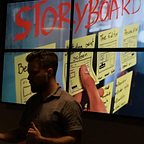Culture, Growth Mindset, Autonomy, and other thoughts
I joined Ambush some months ago. It’s been a time of intense learning, so I wanted to share :)
In the last few years, I’ve been able to read books covering subjects like design strategy, mindset and new ways of seeing “work”. At Ambush, I’ve had the ability to actually implement what I’ve learned. It’s been an awesome experience and I’ll tell you why.
The Culture
At this point in my career, I’ve noticed that the majority of the companies take advantage of the term “culture” and simply use it in a self-serving capacity. Usually, their “culture” is comprised of fake, cookie-cutter declarations and ping pong tables used purely to attract talent. But actually, people can’t create culture overnight. It’s ugly and people will wind up frustrated once they discover it’s artificial.
“You don’t create a culture. Culture isn’t a foosball table or trust falls. It isn’t policy. It isn’t a Christmas party or the company picnic. Those are objects and events, not culture. Culture is action, not words.” Jason Fried, Rework.
While getting started I’ve realized that Ambush has something genuine: The Culture.
It can’t be explained in words. Culture is something that is going on and nobody has to tell you. It’s a set of beliefs in synergy throughout the teams. It’s the vibe. It’s in every act, every conversation, it’s everywhere.
The culture is what creates the foundation for all future innovation. If you break the culture, you break the machine that creates your products. Co-founder of Airbnb, Brian Chesky's article about culture.
Growth Mindset
Carol Dweck wrote the “Mindset”, a great book that tells the difference between the fixed and the growth mindset. At Ambush, I can see the growth mindset alive, all the time.
I used to think of boring income charts every time I heard the term “Growth”. But actually it’s quite simple: Growth mindset is the joy of learning. It’s to get excited with rapid changes and having to discover how new things work. At tech companies “change” is an ordinary thing, so probably this mindset is amongst the most important soft skills that people can have.
This is what I saw since my first step in: excited people stoked by learning and growing.
Work-Life Balance
I realized that work-life balance doesn’t exist.
The term “work-life balance” suggests that work and life are separate, but actually there are no boundaries. It’s all life. To put it into two different boxes seems like we are stuck in the industrial revolution, selling some hours to a businessman.
What if people just love what they do and are not selling their hours. At Ambush, I just feel like I’m living at the same time I’m working. Surrounded by peers that love what they are doing. It’s much more fun.
Trust over Control
Intrinsic motivation is greater than extrinsic. To be self-directed and trusted is way more powerful, in the long term, than money or any other external reward.
So in the end, if you hire the right people with a growth mindset, you can trust them and there is no need for controlling them. Simon Sinek talks about this in the book “Start with Why”.
Purpose
Earlier in my career, I’ve worked in advertising companies and created solutions to boost the tobacco industry. It taught me the real importance of purpose on every project I’m on. I’d rather wake up every morning to help people solve their problems instead of creating more problems for them.
In the end, if Design isn’t about making the difference, then what is it all about?
Feedback is a valuable Gift
As we make our products better by gathering and analyzing data, we can make the same thing with ourselves: collecting feedback. The more honest feedback, the more valuable data you collect as well. It’s not easy to achieve a level of maturity of complete openness for critique but it’s surely one of the greatest virtues designers can have.
We get closer to the level of excellence as a design team, the more we cultivate the common knowledge of seeing feedback as a valuable golden gift.
Warren Buffet said once: “Honesty is a very expensive gift; just don’t expect it from cheap people”
Fabricio Teixeira wrote about many ways of using feedback in Design.
Design Matters
It’s awesome to work with people that believe in design.
Recently, Alan Cooper and Jared Spoon had an intellectual battle. They argued about whether or not designers should measure and prove the importance of Design at the company they are working at. Alan says you should just go work somewhere else and give up companies that don’t understand Design. Jared says you can somehow prove the value of Design and you should keep trying to convince people it’s important.
I get the point of both gurus, however, I believe great designers won’t last much in an environment where there is a lack of confidence in Design. Being the only designer warrior trying to convince a company about the importance and the ROI of UX can be quite tiring and frustrating.
Final Considerations
Being passionate about design processes, I urged for an environment where I could breathe the methods of tackling user and business needs. I just wanted to be surrounded by peers that believe in Design just as much as I do.
Nothing described above exists without great leaders to keep and improve the culture as the business grows.
There’s still a lot to be done.
I’ve learned so much in a short period and I feel like great times are coming.
Cheers!
___
Special thanks to Diego, Leo, and Eduardo Javier
More where this came from
This story is published in Noteworthy, where thousands come every day to learn about the people & ideas shaping the products we love.
Follow our publication to see more product & design stories featured by the Journal team.
